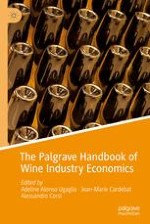2019 | OriginalPaper | Chapter
12. International Wine Organizations and Plurilateral Agreements: Harmonization Versus Mutual Recognition of Standards
Author : Raúl Compés López
Published in: The Palgrave Handbook of Wine Industry Economics
Publisher: Springer International Publishing
Activate our intelligent search to find suitable subject content or patents.
Select sections of text to find matching patents with Artificial Intelligence. powered by
Select sections of text to find additional relevant content using AI-assisted search. powered by
